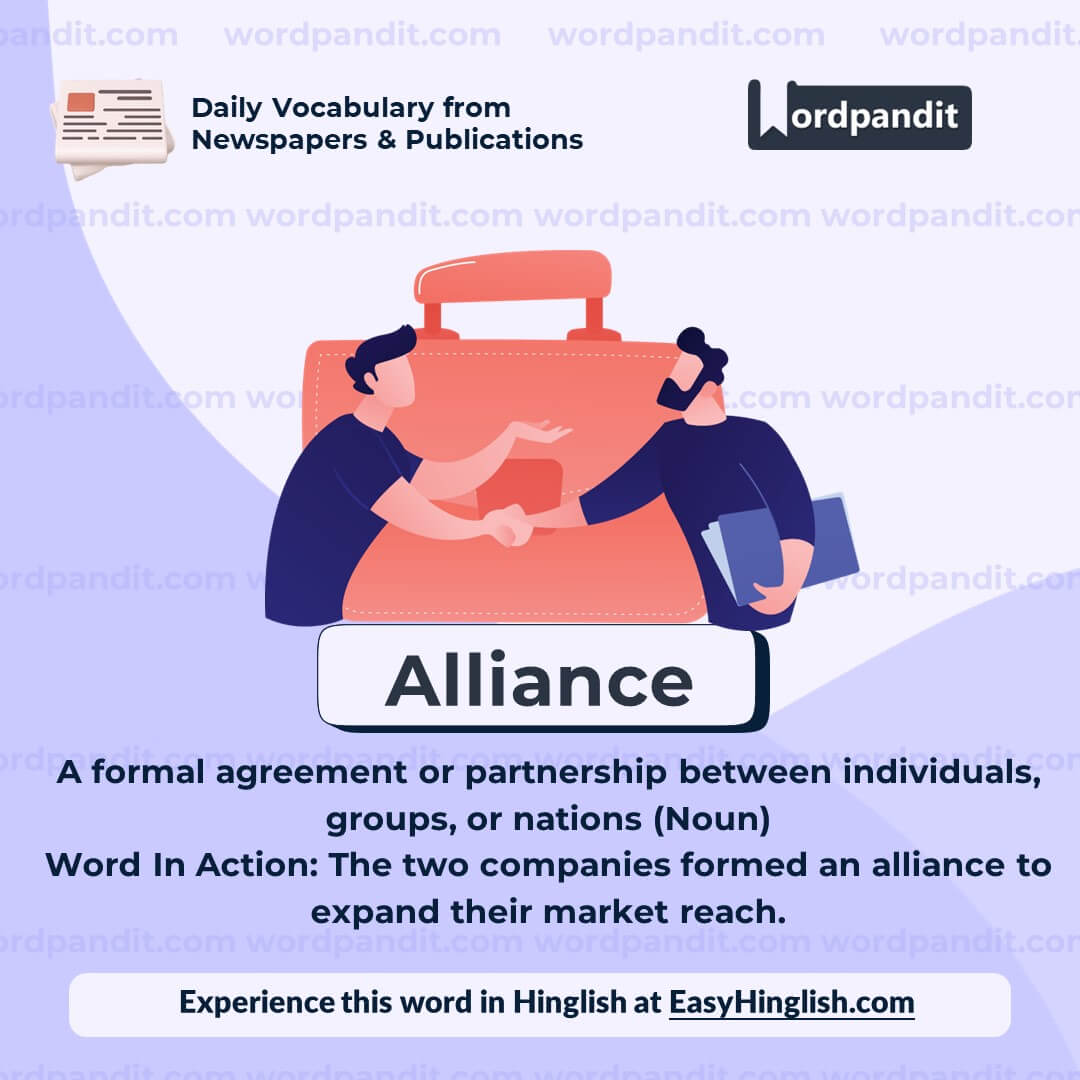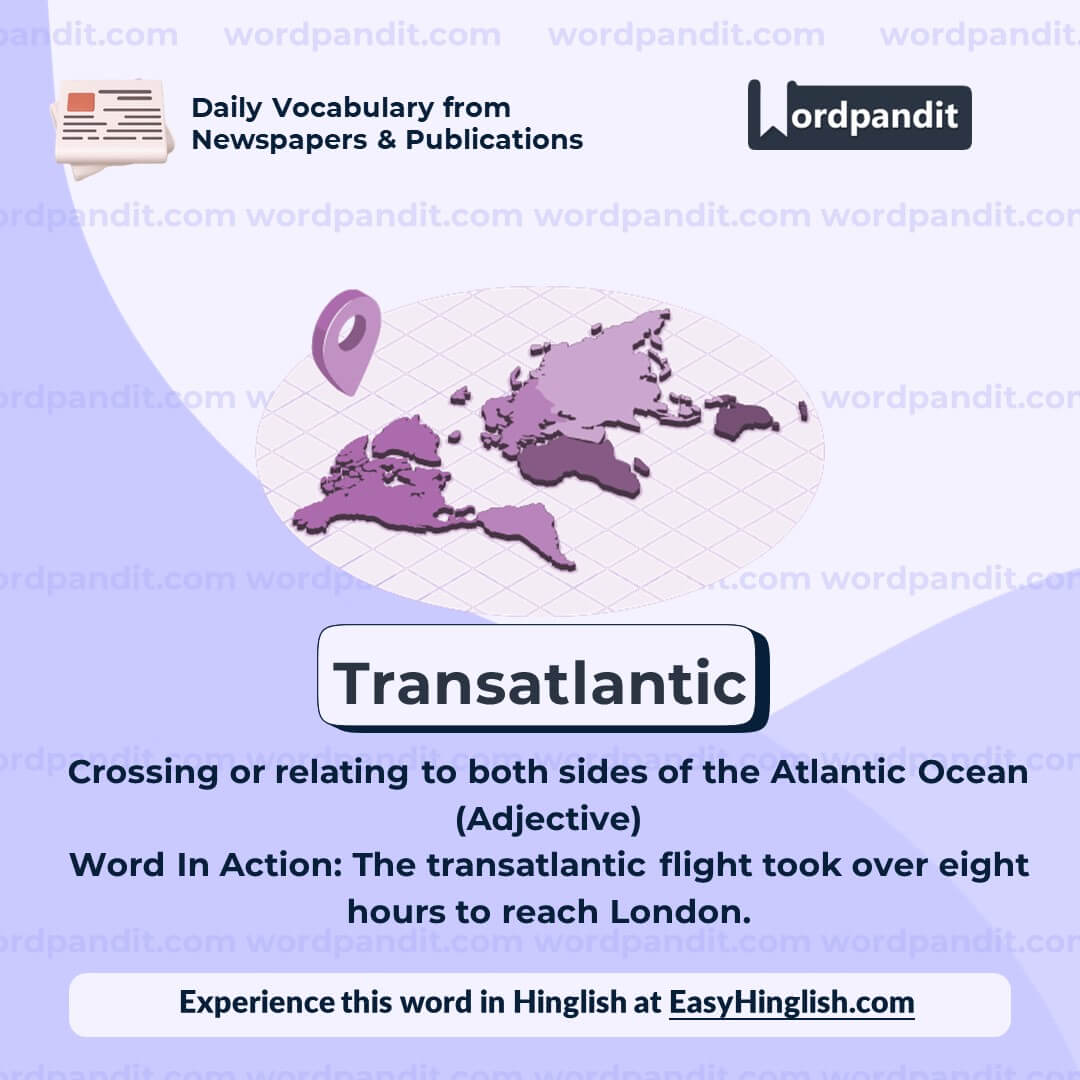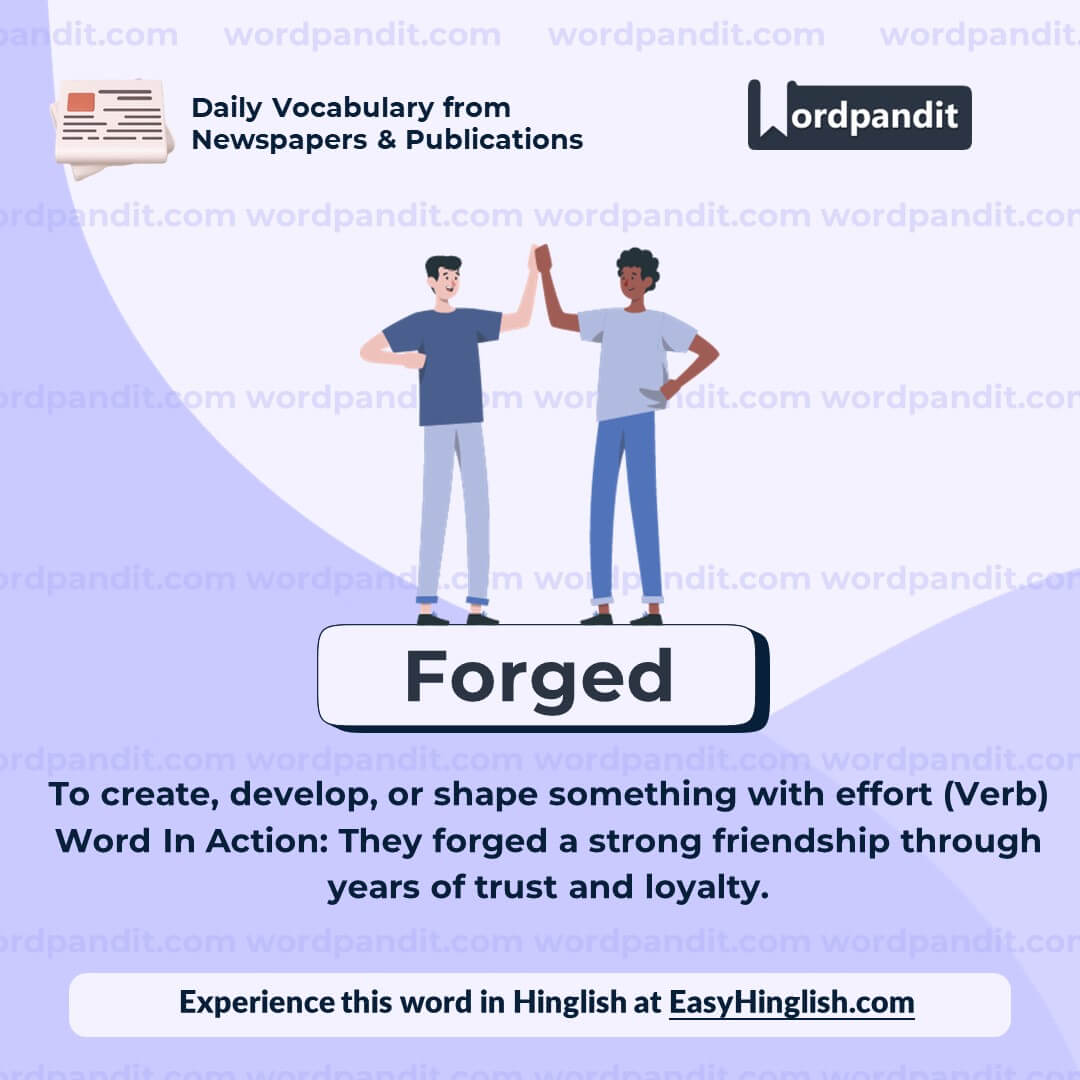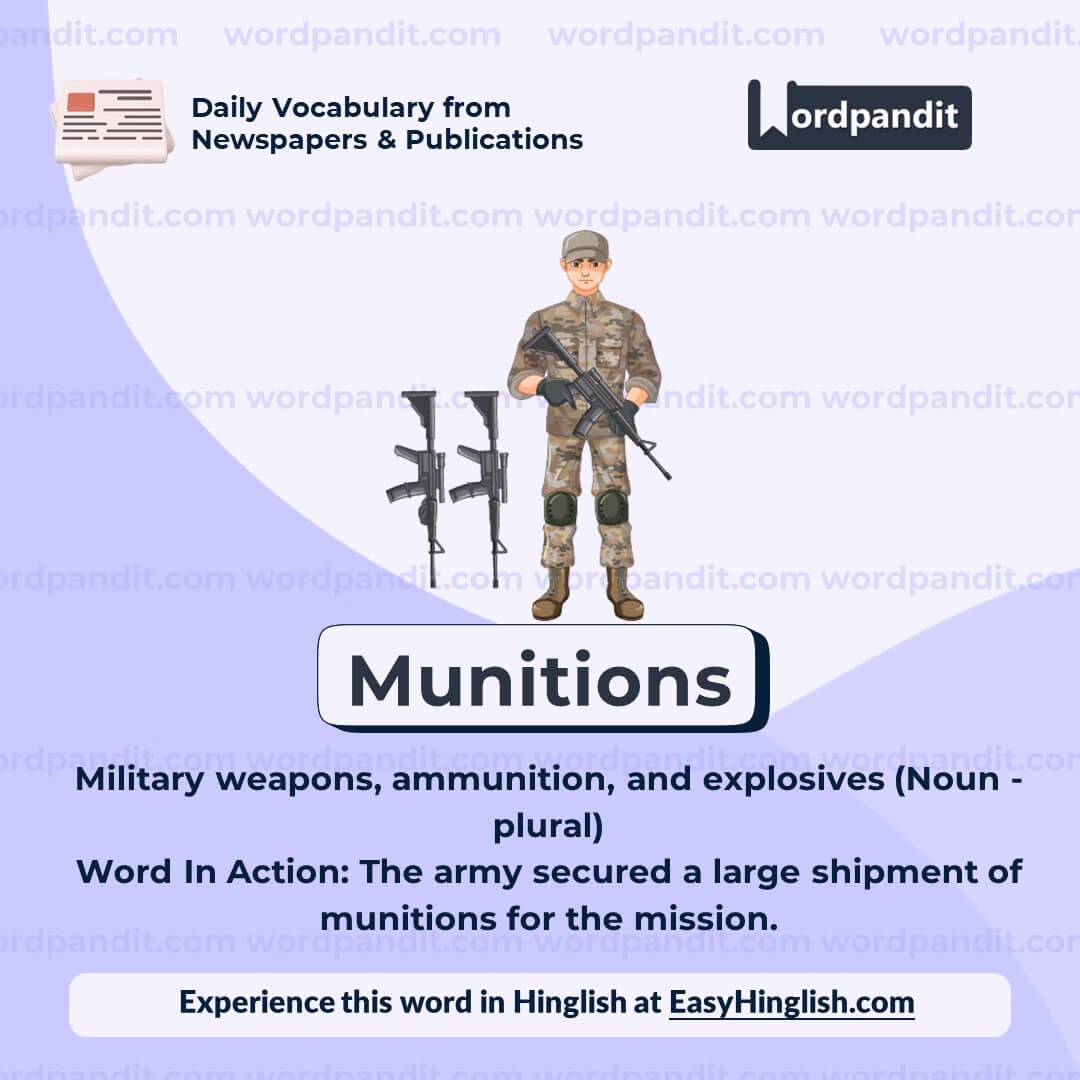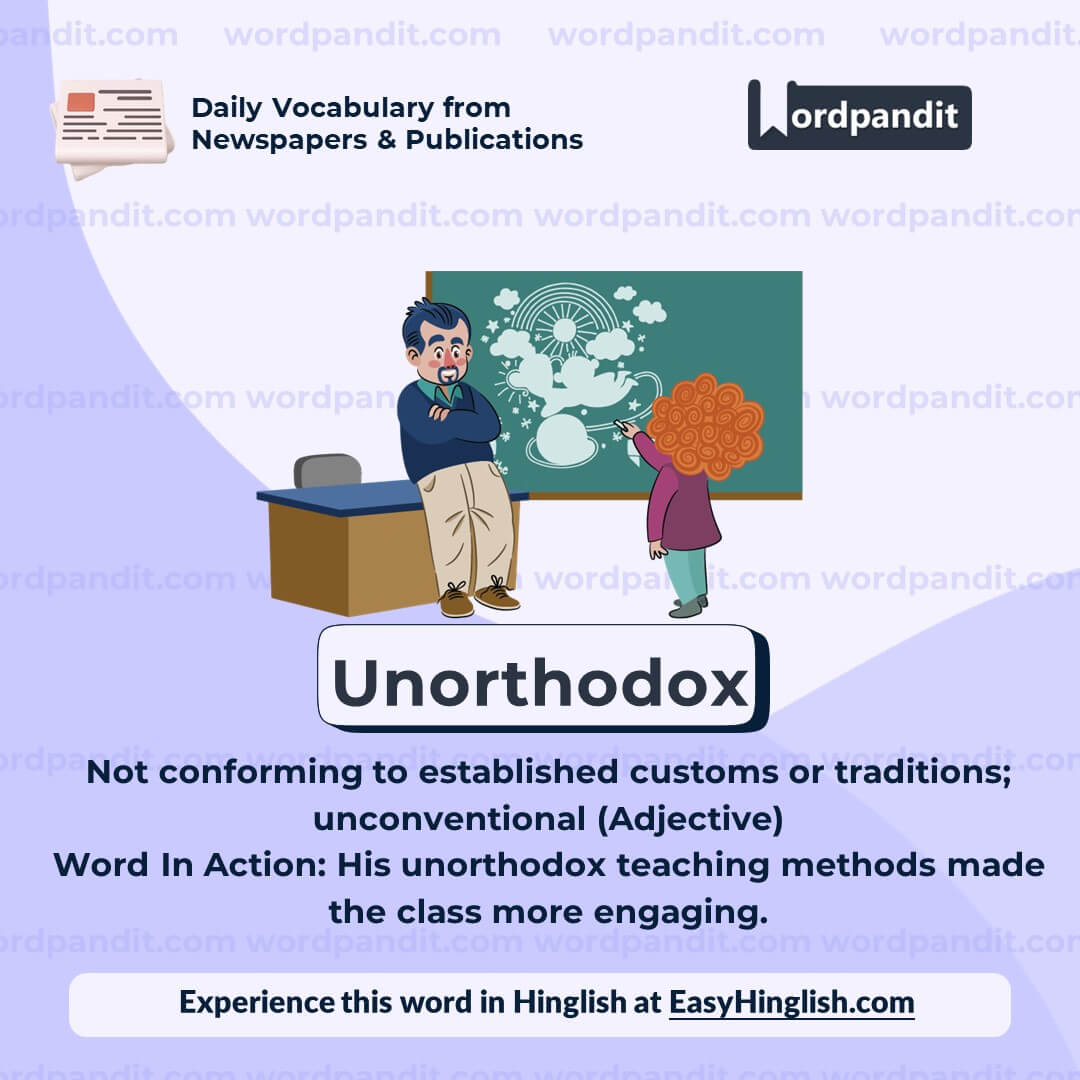Daily Vocabulary from International Newspapers and Publications
Expand Your Vocabulary with Wordpandit’s Global Vocabulary Hub
At Wordpandit, we are committed to helping you develop a truly global vocabulary by drawing from some of the most respected international publications. This section is designed to keep you ahead of the curve by introducing you to words that define global conversations and trends.
The Power of Global Sources
To help you think and communicate on a global scale, we curate vocabulary from renowned international sources, such as:
- The New York Times
- The Washington Post
- BBC
- The Guardian
- The Economist
- Scientific American
- Psychology Today
- And many more...
Stay Global, Stay Competitive
Our daily updates from international publications ensure you are consistently exposed to new words that reflect global news and developments, making sure your vocabulary is not only current but also globally relevant.
Enhance Your Global Perspective
Whether you’re preparing for international exams, aiming to excel in global business communication, or want to enhance your language skills for personal growth, Wordpandit offers the resources you need to thrive in a global context.
Effective Learning, Global Reach
Our learning methodology combines global examples, memory aids, and interactive activities, allowing you to internalize new words effectively and apply them in real-world scenarios.
Begin Your Global Vocabulary Journey Now!
Why Choose Wordpandit?
Practical Learning: Focus on words you'll actually encounter in real-world reading, enhancing your comprehension and communication skills.
Diverse Content: From current affairs to scientific breakthroughs, our varied sources expose you to vocabulary across multiple domains.
Effortless Integration: Make Wordpandit a part of your daily routine. Just a few minutes each day can significantly boost your lexicon over time.
Your Path to Vocabulary Mastery
- Visit our Daily Vocabulary section regularly
- Explore new words and their usage in context
- Practice incorporating these words into your own writing and speech
- Track your progress as your vocabulary expands
Start Your Journey Today
Embark on your vocabulary enhancement journey with Wordpandit. By consistently engaging with our daily posts, you'll build a robust vocabulary that serves you well in academic, professional, and personal contexts.
Remember, a word a day keeps linguistic limitations at bay. Make Wordpandit your daily companion in the quest for vocabulary excellence!
WORD-1: Alliance
Context:
"There's profound realisation that the old 'transatlantic partnership', the solid alliance between Europe and America, is broken." - BBC
Explanatory Paragraph:
An "alliance" refers to a formal agreement or partnership between individuals, groups, or nations working towards a common goal. Alliances often involve cooperation in political, military, or economic matters, ensuring mutual benefits for all parties involved. A strong alliance can create stability and unity, while a broken one can lead to uncertainty and conflict.
Meaning: A formal agreement or partnership between individuals, groups, or nations (Noun)
Pronunciation: uh-LY-uhns
Difficulty Level: ⭐⭐⭐ Intermediate
Etymology: Derived from Old French "aliance," meaning "bond" or "union," and from the Latin "alligare," meaning "to bind to."
Synonyms & Antonyms:
Synonyms: Partnership, coalition, association, union, federation
Antonyms: Rivalry, opposition, separation, discord
Usage Examples:
- The two nations formed an alliance to strengthen their economic ties.
- The political parties entered into an alliance to defeat their common opponent.
- Businesses often create alliances to gain a competitive edge in the market.
- The historic alliance between the two countries helped maintain peace for decades.
Cultural Reference:
"During World War II, the Allied Powers formed an alliance to defeat the Axis Powers." - History Textbooks
Think About It:
What factors contribute to the success or failure of an alliance in politics, business, or personal relationships?
Quick Activity:
List three famous historical or modern alliances and briefly explain their significance.
Memory Tip:
Think of an "alliance" as a group that is "all in" together, working towards a common goal.
Real-World Application:
Alliances are crucial in international relations, where countries collaborate on trade, security, and diplomacy. Similarly, in the business world, companies form alliances to innovate and expand their market presence.
WORD-2: Transatlantic
Context:
"There's profound realisation that the old 'transatlantic partnership', the solid alliance between Europe and America, is broken." - BBC
Explanatory Paragraph:
The word "transatlantic" refers to anything that crosses or spans the Atlantic Ocean. It is commonly used to describe relationships, partnerships, or travel between Europe and North America. In a broader sense, "transatlantic" can also symbolize historical, cultural, and economic ties between these regions.
Meaning: Crossing or relating to both sides of the Atlantic Ocean (Adjective)
Pronunciation: tranz-uh-TLAN-tik
Difficulty Level: ⭐⭐ Beginner
Etymology: Derived from the Latin prefix "trans-" meaning "across" and "Atlantic," referring to the Atlantic Ocean.
Synonyms & Antonyms:
Synonyms: Intercontinental, overseas, cross-Atlantic
Antonyms: Domestic, inland, local
Usage Examples:
- The transatlantic flight from London to New York takes about seven hours.
- The transatlantic trade routes played a crucial role in global commerce.
- The two nations have maintained a strong transatlantic alliance for decades.
- Advancements in technology have made transatlantic communication seamless.
Cultural Reference:
"The Titanic, one of the most famous ships in history, was on a transatlantic voyage when it tragically sank in 1912." - Maritime Archives
Think About It:
How has transatlantic cooperation influenced global politics and trade over the centuries?
Quick Activity:
Research and list three major transatlantic agreements or partnerships that have shaped international relations.
Memory Tip:
Think of "transatlantic" as "trans" (across) + "Atlantic" (the ocean), meaning "across the Atlantic Ocean."
Real-World Application:
Transatlantic connections are vital in diplomacy, trade, and travel. For example, the North Atlantic Treaty Organization (NATO) represents a significant transatlantic military alliance between Europe and North America.
WORD-3: Forged
Context:
"A new relationship with Washington must be forged, and fast." - BBC
Explanatory Paragraph:
The word "forged" can have multiple meanings depending on the context. In this sentence, it means to create or establish something with effort, such as a new relationship or alliance. The word can also refer to shaping metal through heating and hammering, or even to making something fake, like a forged signature. In the given context, it emphasizes the urgency and effort needed to build a strong relationship.
Meaning: To create, develop, or shape something with effort (Verb)
Pronunciation: forjd
Difficulty Level: ⭐⭐⭐ Intermediate
Etymology: Derived from Old French "forgier" and Latin "fabricare," meaning to shape or build.
Synonyms & Antonyms:
Synonyms: Build, establish, create, develop, construct
Antonyms: Destroy, break, dissolve, dismantle
Usage Examples:
- The two nations forged a strong trade agreement after months of negotiation.
- Through years of hard work, she forged a successful career in law.
- The blacksmith forged a beautiful sword using traditional techniques.
- They quickly forged a bond based on mutual respect and trust.
Cultural Reference:
"The strongest steel is forged in the hottest fire." - A popular metaphor indicating that hardships shape strength and resilience.
Think About It:
What are some relationships or achievements in life that require great effort to be forged?
Quick Activity:
Write a short paragraph using "forged" in both its positive and negative meanings (creating something strong vs. creating something fake).
Memory Tip:
Think of a blacksmith forging metal—just like shaping iron with heat and effort, forging relationships or agreements also takes effort and strength.
Real-World Application:
"Forged" is commonly used in politics, business, and personal development. Leaders forge alliances, entrepreneurs forge new paths, and people forge friendships through shared experiences.
WORD-4: Munitions
Context:
"The Ukrainians estimate 156,000 sq km (60,232 sq miles) are contaminated by landmines or other explosive munitions." - BBC
Explanatory Paragraph:
The word "munitions" refers to military weapons, ammunition, and explosives used in warfare. In the given context, it highlights the dangers posed by leftover explosive devices in war zones. Munitions can include bombs, grenades, bullets, and other armaments. The term is often associated with military stockpiles, production, and defense strategies.
Meaning: Military weapons, ammunition, and explosives (Noun - plural)
Pronunciation: myoo-NISH-uhnz
Difficulty Level: ⭐⭐⭐ Intermediate
Etymology: Derived from the French word "munition," which originally meant supplies or fortifications. It traces back to the Latin "munire," meaning "to fortify or equip."
Synonyms & Antonyms:
Synonyms: Weaponry, arms, artillery, ammunition, ordnance
Antonyms: Disarmament, peacekeeping tools, civilian supplies
Usage Examples:
- The military base stored large quantities of munitions for wartime use.
- Explosive munitions left behind after the war continue to pose a serious threat to civilians.
- The government imposed strict regulations on the export of munitions to conflict zones.
- Specialized teams work to safely remove unexploded munitions from former battlefields.
Cultural Reference:
"Wars are not won by munitions alone, but they certainly play a decisive role." - A common military strategy perspective.
Think About It:
What are the long-term consequences of abandoned munitions in post-war regions?
Quick Activity:
List five different types of munitions and research how they are used in modern warfare.
Memory Tip:
Think of "munitions" as "military ammunition"—both involve explosive weaponry used in battle.
Real-World Application:
The term "munitions" is commonly used in military reports, defense policies, and discussions about international security. Understanding it helps in analyzing global conflicts and disarmament efforts.
WORD-5: Unorthodox
Context:
"They are unorthodox, but we wish them luck." - BBC
Explanatory Paragraph:
The word "unorthodox" describes something that deviates from traditional or commonly accepted practices. It often refers to unconventional ideas, methods, or behaviors that challenge the norm. While unorthodox approaches may seem unusual or risky, they can sometimes lead to innovation and success.
Meaning: Not conforming to established customs or traditions; unconventional (Adjective)
Pronunciation: un-OR-thuh-doks
Difficulty Level: ⭐⭐⭐ Intermediate
Etymology: From Greek "orthodoxos" meaning "correct opinion," with "un-" meaning "not," thus forming "unorthodox," meaning "not following traditional beliefs."
Synonyms & Antonyms:
Synonyms: Unconventional, atypical, radical, nontraditional, innovative
Antonyms: Traditional, conventional, standard, accepted
Usage Examples:
- The scientist’s unorthodox approach led to a groundbreaking discovery.
- She wore an unorthodox outfit to the formal event, drawing everyone's attention.
- His unorthodox teaching methods helped students understand complex concepts more easily.
- The company took an unorthodox route by eliminating job titles and promoting equal collaboration.
Cultural Reference:
"Steve Jobs was known for his unorthodox leadership style, which played a key role in Apple's success." - Business Insider
Think About It:
Can unorthodox ideas always be considered innovative, or do they sometimes create unnecessary risks?
Quick Activity:
Think of a famous unorthodox leader, artist, or scientist. Briefly describe their unconventional approach and how it impacted their field.
Memory Tip:
Break "unorthodox" into "un-" (not) + "orthodox" (traditional), meaning "not traditional or usual."
Real-World Application:
Unorthodox thinking is highly valued in fields like technology, business, and art, where innovation often comes from challenging traditional ideas.



